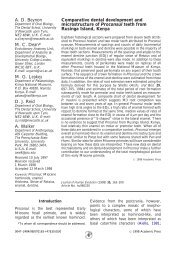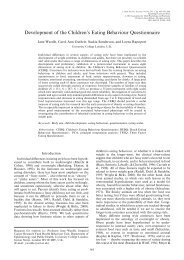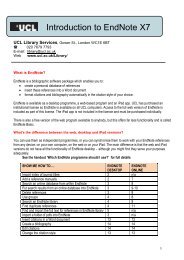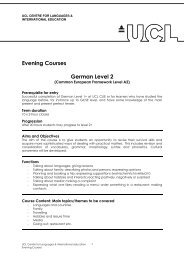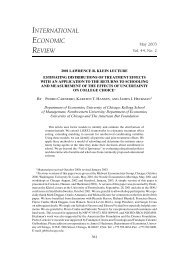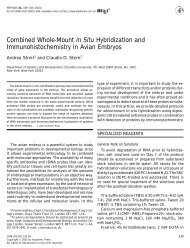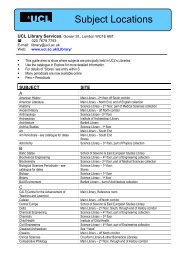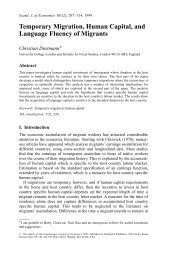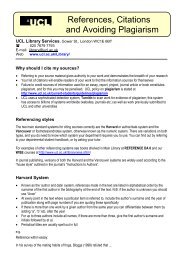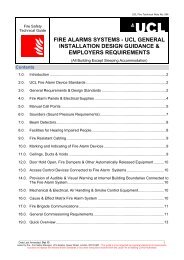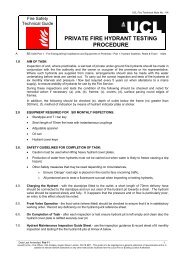European Environmental Policy Lecture 2 The EU Single ... - UCL
European Environmental Policy Lecture 2 The EU Single ... - UCL
European Environmental Policy Lecture 2 The EU Single ... - UCL
Create successful ePaper yourself
Turn your PDF publications into a flip-book with our unique Google optimized e-Paper software.
EEP_singlemarket_slides.doc<br />
<strong>European</strong> <strong>Environmental</strong> <strong>Policy</strong><br />
<strong>Lecture</strong> 2<br />
<strong>The</strong> <strong>EU</strong> <strong>Single</strong> Market and environmental protection<br />
1. <strong>The</strong> <strong>Single</strong> Market programme: reasons and<br />
requirements<br />
2. Product standards and the single market. "Mutual<br />
recognition" and its implications<br />
3. Cases of conflict between rules of the <strong>Single</strong> Market<br />
and national environmental policies.<br />
4. Institutional competition, "environmental dumping"<br />
and efficiency
<strong>The</strong> <strong>EU</strong> <strong>Single</strong> Market<br />
<strong>The</strong> <strong>European</strong> Economic Community (EEC)<br />
• 1957 Treaty of Rome established EEC with six member<br />
countries (France, Germany, Italy and BENELUX)<br />
• UK, Ireland, Denmark joined in 1973<br />
• Now 15 members, and further enlargement soon<br />
Central policy was customs union among member states<br />
• Customs Union = free trade area between member states,<br />
with common external trade policy<br />
• Tariffs (taxes on imports) eliminated over first 10 years<br />
• Economic integration (intra-EEC trade as percentage of<br />
sales in member state markets) grew rapidly during 1960s<br />
and 1970s<br />
Objectives of free trade area<br />
Efficiency<br />
• the most efficient producers supply <strong>EU</strong> market, not<br />
protected national firms<br />
• allocation of production according to comparative<br />
advantage<br />
Scale economies<br />
• larger market allows rationalisation of production into<br />
lager-scale firms - reducing cost per unit of production<br />
Competition<br />
• larger market has more firms than protected national<br />
markets, and hence more vigorous competition<br />
Variety<br />
• consumers have access to a wider range of goods and<br />
services<br />
2
<strong>The</strong> <strong>Single</strong> Market ("1992") programme<br />
By the early 1980s:<br />
• a growing awareness that abolition of tariffs had not<br />
eliminated all obstacles to trade between member states<br />
• growth in integration had slowed.<br />
EC market remained segmented into separate national<br />
markets:<br />
• considerable price differences between member states<br />
• national producers dominated national markets<br />
• EC market remained much less integrated than US market<br />
• failure to reap full economic gains from trade integration<br />
1985 Commission White Paper "Completing the Internal<br />
Market" ("Cockfield" White Paper)<br />
• drew attention to role of national governments in<br />
segmenting EC market<br />
• highlighted role of various non-tariff barriers<br />
• proposed programme of measures ("1992 programme") to<br />
eliminate these non-tariff barriers<br />
1986 <strong>Single</strong> <strong>European</strong> Act<br />
• amendment to Treaty of Rome<br />
• required White Paper programme of measures to be<br />
implemented by end-1992<br />
• abolition of internal frontier controls<br />
• "mutual recognition" of national product standards instead<br />
of negotiated harmonisation<br />
• range of other measures: abolition of exchange controls,<br />
tax "approximation", liberalisation of capital markets,<br />
financial services, etc<br />
3
Product standards and the 1992 programme<br />
Reasons for inclusion in "1992" programme<br />
1. Multiple standards involve costs of duplication<br />
eg multiple certification for medicines<br />
2. Multiple standards segment <strong>European</strong> Market<br />
• the costs of meeting different national standards<br />
discourages some firms from <strong>EU</strong>-wide trading<br />
• less-intensive competition, foregone economies of scale<br />
3. Danger of strategic use of product standards<br />
• national standards policy can be used as a form of<br />
protection<br />
• countries can design standards to protect national firms<br />
and exercise market power by setting standards to suit<br />
national producers<br />
4
Why do we have product standards anyway?<br />
1. Consumer safety<br />
• regulation may sometimes be preferable to<br />
alternatives:<br />
(i) provision of information<br />
(ii) ex post legal liability for harm<br />
2. Enforcement of minimum quality<br />
• if consumers cannot easily observe quality before<br />
buying the product<br />
3. To limit product variety<br />
• consumers may be confused by complex products<br />
- eg insurance contracts<br />
4. "Rule-of-the-Road" choices<br />
• where a decision is more important than which decision<br />
- (eg compatibility issues)<br />
5. Technology choice<br />
• market can be slow and costly way of determining best<br />
technology<br />
5
Ex ante Harmonisation (EAH)<br />
versus<br />
Mutual Recognition (MR)<br />
• EAH may be slow as countries hold out for deal most<br />
favourable to national firms<br />
• MR allows immediate access, and sidesteps inefficient<br />
barriers to access<br />
- eg Cassis de Dijon case - too much alcohol<br />
• MR may undermine effectiveness of standards<br />
- (where these enforce minimum quality)<br />
- introduces "lemons" problem between national<br />
standards<br />
• MR may undermine safety standards<br />
- excluded in 1992 programme<br />
• incentive to "downward competition" in regulation?<br />
6
National environmental policies and competition in the<br />
<strong>EU</strong> market<br />
Two examples where national environmental policies have come into<br />
conflict with <strong>EU</strong> rules on market access;<br />
• Dutch "clean car" legislation<br />
• Danish deposit-refund scheme for bottles<br />
In both cases, the issue was whether a policy introduced for<br />
environmental reasons had the side-effect of protecting national<br />
producers from import competition.<br />
National product standards with a significant fixed cost of compliance<br />
can protect domestic firms if these have the largest market share.<br />
Designing motor vehicles specifically to meet the Dutch "clean car"<br />
requirements would only be worthwhile for producers intending to sell<br />
large volumes in the Dutch market. Often these would be domestic<br />
firms (but nb little car manufacture in NL!), and hence advantage to<br />
domestic firms.<br />
In the Danish bottles case, the arrangements to collect and re-use<br />
bottles returned to retailers would have a substantial fixed cost,<br />
unrelated to the volume of bottles sold and collected. For an importer<br />
with small market share this would be a higher cost per unit than for<br />
an incumbent national firm with a higher volume of sales.<br />
Other areas of national environmental policy might raise similar<br />
problems (eg other provisions for Extended Producer Responsibility).<br />
<strong>The</strong>se issues also arise in international trade more generally. Hence<br />
the growing importance of WTO rules, regulating conduct of<br />
international trade, in constraining national environmental policies<br />
eg WTO forbids policies which discriminate between products on the<br />
basis of their production process. This prevents import restrictions on<br />
products produced by "dirty" firms abroad, but also limits countries'<br />
ability to enforce rules on trade in ecologically-damaging products<br />
(tuna, etc)<br />
7
Institutional Competition<br />
Horst Siebert (1991) "<strong>The</strong> New Economic Landscape in<br />
Europe" emphasises the potential benefits of institutional<br />
competition:<br />
• citizens may have different preferences for regulation, and<br />
decentralised policy allows countries to make different<br />
choices in the tradeoff between economic activity (and<br />
hence incomes) and regulatory protection<br />
• some regulations contribute to a more efficient business<br />
environment - countries that offer an attractive package of<br />
regulations will be a more attractive location for production<br />
than those that offer a package of "red tape"<br />
• geographical and other features of countries imply different<br />
"needs" for regulation. Countries which have an<br />
environment that can assimilate more emissions without<br />
adverse damage have a natural advantage (cf. amount of<br />
sunshine) that should not be offset by requiring equal<br />
regulatory stringency in all locations.<br />
In summary:<br />
• <strong>Environmental</strong> externalities between countries may<br />
justify policy coordination or harmonisation.<br />
• Economic spillovers arising through institutional<br />
competition do not. (Siebert argues that these are<br />
"pecuniary" externalities)<br />
8
<strong>The</strong> "<strong>Environmental</strong> Dumping" debate<br />
<strong>The</strong> central idea is that countries with lower standards of<br />
environmental protection achieve an "unfair" competitive<br />
advantage in international trade. Firms in these countries bear<br />
lower burden of regulation (lower costs of pollution abatement),<br />
and can hence undercut prices of firms located in countries<br />
requiring more environmental protection.<br />
Does this justify trade protection, or import taxes to offset the price<br />
advantage enjoyed by firms in low-regulation countries?<br />
Industries affected by such competition often argue that it does.<br />
But is this just "special pleading"?<br />
A country imposing tariffs on imports harms itself (by foregoing the<br />
opportunity to purchase imported goods more cheaply than the<br />
cost of domestic production).<br />
Where national environmental policies affect the national<br />
environment only (ie excluding cases such as acid rain and global<br />
warming), a counntry that is willing or able to accept polluting<br />
industries performs a service to countries that wish to have a<br />
cleaner environment. Abatement through relocation may be<br />
cheapest abatement option.<br />
Larry Summers' World Bank memo drew attention to the fact that<br />
developing countries might have greater priority to "income" over<br />
"environment", and relocation of polluting industries is thus<br />
mutually beneficial.<br />
<strong>The</strong> argument is controversial, especially where:<br />
• the relocation arises because polluting firms in LDCs evade or<br />
disregard local environmental laws<br />
• international trade reduces the ability of all countries to monitor<br />
and control hazardous pollution problems<br />
• some countries are not governed in the interests of their people<br />
• the environmental policies concern problems where there are<br />
spillovers between countries<br />
9
Competition in environmental standards: economic<br />
theory and empirical evidence<br />
Empirical evidence that environmental policies in the<br />
industrialised countries may have affected the international<br />
pattern of economic activity.<br />
Hettige, Lucas and Wheeler (1992)<br />
• output of pollution-intensive activities grew faster in LDCs<br />
than OECD countries over previous two decades<br />
• possibly reflects relocation of pollluting industries to LDCs<br />
in response to tighter environmental standards in<br />
developed countries.<br />
Key issue is not whether relocation has occurred, but<br />
whether, in response to relocation or the threat of relocation,<br />
policy-makers have been induced to set environmental<br />
standards which do not reflect the true willingness-to-pay of<br />
their residents for environmental quality.<br />
10




